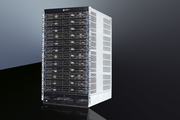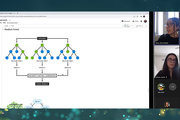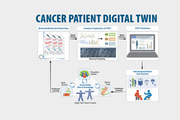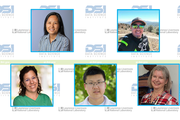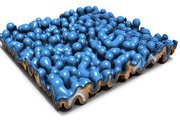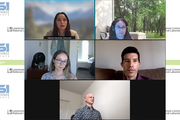Did you know we have a monthly newsletter? View past volumes and subscribe.
LLNL researchers win HPCwire award for applying cognitive simulation to ICF
Nov. 17, 2022 -
The high performance computing publication HPCwire announced LLNL as the winner of its Editor’s Choice award for Best Use of HPC in Energy for applying cognitive simulation (CogSim) methods to inertial confinement fusion (ICF) research. The award was presented at the largest supercomputing conference in the world: the 2022 International Conference for High Performance Computing, Networking...
ESGF launches effort to upgrade climate projection data system
Oct. 5, 2022 -
The Earth System Grid Federation (ESGF), a multi-agency initiative that gathers and distributes data for top-tier projections of the Earth’s climate, is preparing a series of upgrades that will make using the data easier and faster while improving how the information is curated. The federation, led by the Department of Energy’s Oak Ridge National Laboratory in collaboration with Argonne and...
Scientific discovery for stockpile stewardship
Sept. 27, 2022 -
Among the significant scientific discoveries that have helped ensure the reliability of the nation’s nuclear stockpile is the advancement of cognitive simulation. In cognitive simulation, researchers are developing AI/ML algorithms and software to retrain part of this model on the experimental data itself. The result is a model that “knows the best of both worlds,” says Brian Spears, a...
LLNL to cooperate with University of Utah's one oneAPI Center of Excellence
Sept. 21, 2022 -
The University of Utah has announced the creation of a new oneAPI Center of Excellence focused on developing portable, scalable and performant data compression techniques. The oneAPI Center will be headed out of the University of Utah’s Center for Extreme Data Management Analysis and Visualization (CEDMAV) and will involve the cooperation of LLNL’s Center for Applied Scientific Computing. It...
LLNL team claims top AI award at international symbolic regression competition
Aug. 16, 2022 -
An LLNL team claimed a top prize at an inaugural international symbolic regression competition for an artificial intelligence (AI) framework they developed capable of explaining and interpreting real-life COVID-19 data. Hosted by the open source SRBench project at the 2022 Genetic and Evolutionary Computation Conference (GECCO), the competition had two tracks—synthetic and real-world—and...
Lab researchers win top award for machine learning-based approach to ICF experiments
Aug. 4, 2022 -
The IEEE Nuclear and Plasma Sciences Society (NPSS) announced an LLNL team as the winner of its 2022 Transactions on Plasma Science Best Paper Award for their work applying machine learning to inertial confinement fusion (ICF) experiments. In the paper, lead author Kelli Humbird and co-authors propose a novel technique for calibrating ICF experiments by combining machine learning with...
An open-source, data-science toolkit for energy: GridDS
Aug. 2, 2022 -
As the number of smart meters and the demand for energy is expected to increase by 50% by 2050, so will the amount of data those smart meters produce. While energy standards have enabled large-scale data collection and storage, maximizing this data to mitigate costs and consumer demand has been an ongoing focus of energy research. An LLNL team has developed GridDS—an open-source, data-science...
Defending U.S. critical infrastructure from nation-state cyberattacks
July 21, 2022 -
For many years, LLNL has been conducting research on cybersecurity, as well as defending its systems and networks from cyberattacks. The Lab has developed an array of capabilities to detect and defend against cyberintruders targeting IT networks and worked with government agencies and private-sector partners to share its cybersecurity knowledge to the wider cyberdefense community. LLNL has...
Assured and robust…or bust
June 30, 2022 -
The consequences of a machine learning (ML) error that presents irrelevant advertisements to a group of social media users may seem relatively minor. However, this opacity, combined with the fact that ML systems are nascent and imperfect, makes trusting their accuracy difficult in mission-critical situations, such as recognizing life-or-death risks to military personnel or advancing materials...
CASC team wins best paper at visualization symposium
May 25, 2022 -
A research team from LLNL’s Center for Applied Scientific Computing won Best Paper at the 15th IEEE Pacific Visualization Symposium (PacificVis), which was held virtually on April 11–14. Computer scientists Harsh Bhatia, Peer-Timo Bremer, and Peter Lindstrom collaborated with University of Utah colleagues Duong Hoang, Nate Morrical, and Valerio Pascucci on “AMM: Adaptive Multilinear Meshes.”...
NNSA and Cornelis Networks to collaborate on next-generation high-performance networking
May 4, 2022 -
The Next-Generation High Performance Computing Network (NG-HPCN) project for the NNSA’s Advanced Simulation and Computing (ASC) program will enable NNSA to co-design and partner with Cornelis on development and productization of next-generation interconnect technologies for HPC. The project is led by LLNL for the NNSA Tri-Labs: LLNL, Los Alamos and Sandia national laboratories. The resulting...
Accelerating the path to precision medicine
March 22, 2022 -
LLNL joined the Transforming Research and Clinical Knowledge in Traumatic Brain Injury (TRACK-TBI) consortium in 2018. The national, multiyear, multidisciplinary effort, led by the University of California at San Francisco in collaboration with Lawrence Berkeley and Argonne national laboratories and other leading research organizations and universities, combines neuroimaging, blood-based...
Winter hackathon meets WiDS datathon
March 9, 2022 -
Sponsored by the DSI, LLNL’s winter hackathon took place on February 16–17. Hackathons are 24-hour events that encourage collaborative programming and creative problem solving. In addition to traditional hacking, the hackathon included a special datathon competition in anticipation of the Women in Data Science (WiDS) conference on March 7. Hackathon and datathon participants presented their...
COVID-19 R&D: Computing responds to pandemic
Jan. 19, 2022 -
When the COVID-19 pandemic began, the Laboratory immediately started seeking solutions to the myriad challenges posed by the global crisis. The Computing Directorate jumped right in with research and development activities that combine molecular screening to inform antiviral drug experimentation; a generative molecular design software platform to optimize properties of antiviral drugs; an...
Digital twins for cancer patients could be ‘paradigm shift’ for predictive oncology
Dec. 16, 2021 -
A multi-institutional team, including an LLNL contributor, has proposed a framework for digital twin models of cancer patients that researchers say would create a “paradigm shift” for predictive oncology. Published online Nature Medicine on November 25, the proposed framework for Cancer Patient Digital Twins (CPDTs) — virtual representations of cancer patients using real-time data — would...
Career panel spotlights diversity, equity, and inclusion
Nov. 19, 2021 -
The DSI’s career panel series continued on November 3 with a session highlighting diversity, equity, and inclusion (DEI) as well as the Lab’s DEI-focused employee resource groups (ERGs). ERGs are sponsored by LLNL’s Office of Strategic Diversity and Inclusion Programs.
Moderator Anh Quach, member of the Asian Pacific American Council (APAC), was joined by four panelists: Raul Viera Mercado...
Summer scholar develops data-driven approaches to key NIF diagnostics
Oct. 20, 2021 -
Su-Ann Chong's summer project, “A Data-Driven Approach Towards NIF Neutron Time-of-Flight Diagnostics Using Machine Learning and Bayesian Inference,” is aimed at presenting a different take on nToF diagnostics. Neutron time-of-flight diagnostics are an essential tool to diagnose the implosion dynamics of inertial confinement fusion experiments at NIF, the world’s largest and most energetic...
Data Science Challenge welcomes UC Riverside
Oct. 11, 2021 -
Together with LLNL’s Center for Applied Scientific Computing (CASC), the DSI welcomed a new academic partner to the 2021 Data Science Challenge (DSC) internship program: the University of California (UC) Riverside campus. The intensive program has run for three years with UC Merced, and it tasks undergraduate and graduate students with addressing a real-world scientific problem using data...
Lab-led effort one of nine DOE-funded data reduction projects
Sept. 17, 2021 -
An LLNL-led effort in data compression was one of nine projects recently funded by the DOE for research aimed at shrinking the amount of data needed to advance scientific discovery. Under the project—ComPRESS: Compression and Progressive Retrieval for Exascale Simulations and Sensors—LLNL scientists will seek better understanding of data-compression errors, develop models to increase trust in...
Former interns share insights during career panel
Aug. 19, 2021 -
The DSI’s new career panel series continued on August 10 with a session featuring former LLNL interns who converted to full-time employment at the Lab. Inspired by the annual Women in Data Science conference, the panel session was open to all LLNL staff and students. Moderator Mary Silva was joined by panelists from the Computing and Engineering Directorates: Brian Bartoldson, Jose Cadena...










